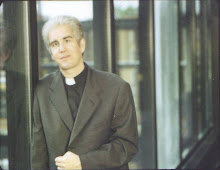I genuinely admire the optimism of preachers who attempt to move their congregations from arriving at the empty tomb to proclaiming that Christ is risen, indeed, all in a single Easter sermon. It’s so Matthean. Of course, Matthew had an earthquake, an angel, who descends from heaven, rolls away the stone, tells the women (twice) that Jesus has been raised, invites them to see the place where Jesus lay, and instructs them to go and tell the disciples that Jesus is risen and where they can find him—in Galilee, as Jesus promised. If this is not amazing enough, as the women leave the tomb, they run into Jesus.
This year, we get Luke. “But these words [that the Son of Man must be handed over to sinners, and be crucified, and on the third day rise again] seemed to them [the disciples] an idle tale, and they did not believe them” (24:11).” Luke tells us. And then Luke tells us that, after Peter got up and ran to the tomb, stooped and looked in, and saw the linen cloths by themselves, he went home (24:12).
And this “idle tale” comes after a week of “idle tales.” On Passion Sunday, Luke told us that, to the end, innocent Jesus associated with sinners and extended them God’s forgiveness. Many in need of forgiveness who have experienced the realities of Christian community would call this an “idle tale.” On Maundy Thursday, John told us the “idle tale” of Jesus, with a towel and basin, doing more than becoming his servants’ servant. Jesus loves his own to the end, even though his own misunderstand, protest, resist his love, and even betray him. For any who are seriously grappling with the ways they have misunderstood, protested, resisted, and betrayed Jesus, the idea of Jesus washing their feet, let alone unconditionally loving them to the end, at some level seems an “idle tale.” On Good Friday, John tells is the “idle tale” of a Passover lamb that declares his work “complete” and then dies. As the institutional church fights so hard for survival on every level, we would hardly call this “idle tale” being faithful to God. We know too well that ”faithfulness” means “growth.”
So, perhaps we can understand why, on n the Second Sunday of Easter, at least as the lectionary tells it, we hear that, a week after the risen Christ appears to them, the disciples are still locked behind locked doors. On the Third Sunday of Easter, the disciples are out from behind locked doors, but they are not proclaiming, “Christ is risen, indeed!” Seven disciples decide to go fishing, and the risen Christ needs to appear to them the third time. It seems to take the disciples, who had direct encounters with the risen Christ, time to embrace and internalize the Easter gospel.
Perhaps we can be patient with ourselves, our Easter preaching, and, most of all with God’s people. The Church, through its lectionary and liturgical calendar, is wise in giving us seven Sundays to preach that, “Christ is risen, indeed!” Whether we frame resurrection as forgiveness, reconciliation, new beginning, or the end of death, we can find much, both inside and inside the Church, to suggest that the Easter message is an “idle tale” or the Church’s wishful thinking. Daring to believe—as in trust—the Easter gospel is, perhaps, the hardest thing we ask our people to do. Perhaps that’s why the Church gives us an Easter season.
At least during Luke’s year, before we run too quickly to telling people to go and tell, “let us” (my students know how I don’t like that phrase in sermons, because it’s a nice way of saying ”we should”) patiently proclaim the good news that Christ is risen, so people can move from the idleness of the tale to their own doubt and hesitation to trying to get life back to normal—and finding they cannot. In other words, let us use this Easter season to help disciples grapple with the Easter gospel, as the first disciples did, confident that Christ will send the promised Spirit.
You know, if we are going to give our hearers the Easter season to wrestle with the “idle tale” of Christ’s resurrection, I suspect that we preachers need to do this ourselves. Like Cleopas and his companion, I hope that you find partners and a journey in which you ca discuss these things and I pray that the risen Christ encounters you as you walk and talk together.
Craig A. Satterlee, Editor, “Preaching Helps”
http://craigasatterlee.com
Sunday, December 13, 2009
Subscribe to:
Post Comments (Atom)

No comments:
Post a Comment